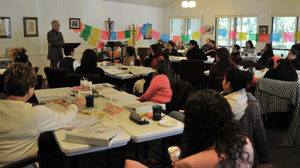Un Pacto de Amor – Retiro para parejas
26-28 de septiembre del 2014
Viernes 6:30pm hasta 2:00pm el domingo.
Presentado por: César Prada
Para inscripción por internet (Online) presionar aquí.
Para imprimir el volante y forma de inscripción presionar aquí:

